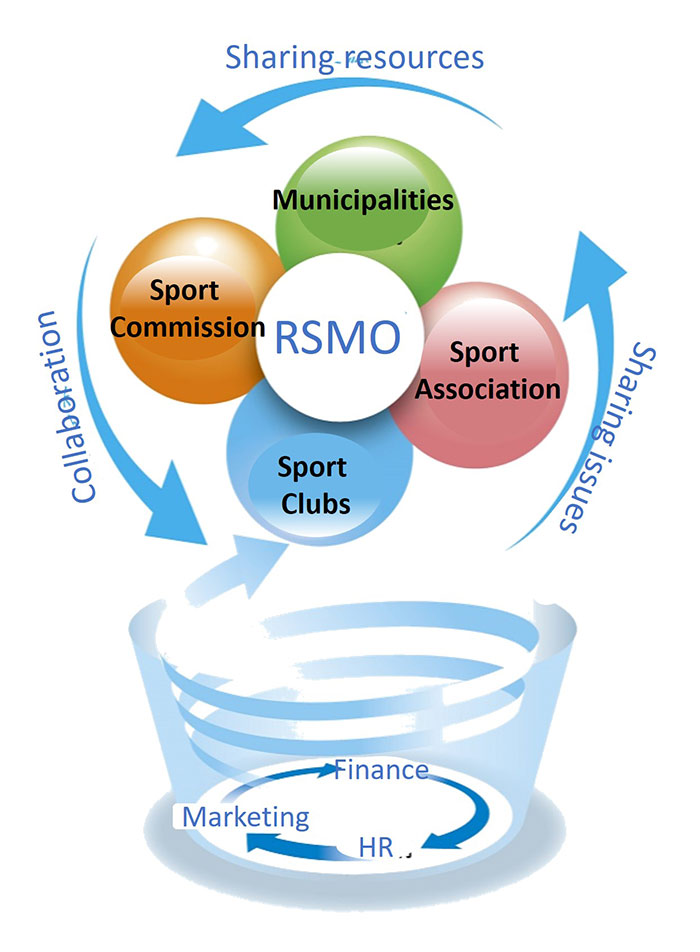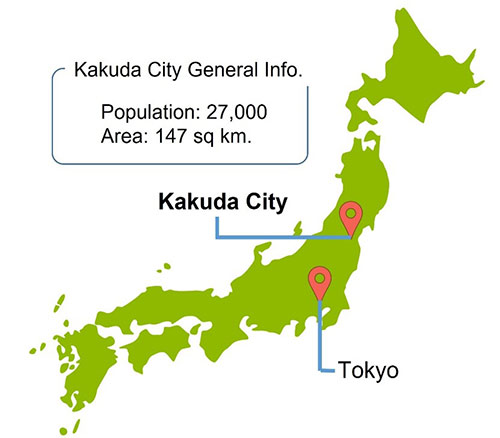A) Overview and four steps to begin
The SSF works closely with local governments to build “Active Cities,” one of the 13 themes identified in the TAFISA Mission 2030. In Active Cities, physical activity is prioritized everywhere that people live and work with the aim of promoting physical, mental, and social well-being. The SSF advocates for the establishment of Regional Sport Management Organizations (RSMO), which are a platform for both public and private sectors committed to local sport promotion, to maximize the effectiveness of limited human, fiscal, and other resources in promoting local sports initiatives.
Conceptual Diagram of RSMO
SSF has been working closely with Kakuda City to develop it as an Active City since 2016. Through collaboration with SSF, Kakuda City adopted the idea of RSMO and established Sponet Kakuda in 2019 as its original RSMO. Multiple stakeholders, such as municipality officials, local sports associations, community leaders, facility managers, local sport clubs, schools, and local universities or sport federations, have worked together to make it an active city.
Background of establishing an RSMO in Kakuda City
- Expectations for the Power of Sports
- In 2017, the national government (Japan Sports Agency) started Japan’s second Sport Basic Plan
- The city started considering establishing its new Roadside Station (Michi no Eki; a base for promoting local tourism) next to a local sports facility
- Difficulties in continuing to provide sports opportunities due to limited human resources related to Japan’s Hyper-Aging Society
- Launch of the SSF’s sport policy proposal, Regional Sport Management Organization (RSMO), in 2017
Sponet Kakuda consists of four teams, namely 1) Promotion Team, 2) Sport for Children Team, 3) School Club Transfer Team, and 4) Sport Hub Development Team. Sponet Kakuda prioritizes a series of themes from both the “inner” and “outer” perspectives for the city.
1) Themes from the inner perspective
- How to engage more people to enjoy sports and physical activities
- How to change the mindset toward sports among local residents
2) Themes from the outer perspective
- How to develop and promote sport tourism in Kakuda
C) Kakuda Active Child Program (Example of a collaborative initiative between SSF and Sponet Kakuda)
The Active Child Program (ACP) is an exercise program developed and promoted by the Japan Sport Association (JSPO), a member organization of TAFISA-JAPAN, to enable children to learn necessary motor skills while enjoying play. Under the auspices of the Japan Sports Agency, SSF and Sponet Kakuda have developed Kakuda’s version of ACP.
Details of ACP are available in the SSF article “Promoting Children’s Growth Through Sports.”
D) Conclusion
As one of the key messages of RSMO is “No to silos! Yes to unity!,” it is crucial to collect knowledge, human, and financial resources broadly from both the public and private sectors of the municipality. Based on this concept and on the idea of RSMO, SSF is striving with local communities to promote Sport for All, and to realize a Sport for Everyone society.


